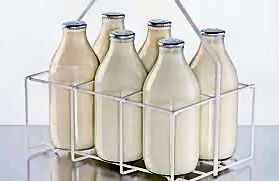Boomerang Alliance push container deposits system
 Whereas most recycling (apart from composting and metals) is pretty energy-costly and pollution-generating and not worth doing, recycling of drink containers that can actually be reused - notably glass containers - would substantially reduce litter and plastic pollution. Complementary to such a scheme should be discouragement of throw-away plastic containers. There is so much we can still do to reduce our energy-footprints, as well as reducing population growth.
Whereas most recycling (apart from composting and metals) is pretty energy-costly and pollution-generating and not worth doing, recycling of drink containers that can actually be reused - notably glass containers - would substantially reduce litter and plastic pollution. Complementary to such a scheme should be discouragement of throw-away plastic containers. There is so much we can still do to reduce our energy-footprints, as well as reducing population growth.

Bins for North East Victoria – a feeble step for a giant problem
The launch today in Rutherglen of Coca Cola’s ‘National Bin Network’ pilot litter initiative is feeble and will hardly scratch the surface of the region’s and state’s annual 2.5 billion landfilled or littered beverage containers, the Boomerang Alliance of 17 environment groups said today.
“The launch is intended to distract from the real game changer which is a national 10cent container deposit scheme (CDS) currently being considered by environment ministers. It’s just another part of the beverage industry’s tactic to avoid taking real responsibility and leave all future management costs to councils,” said Jeff Angel, National Convenor of the Alliance.
“The proposal for more bins in the street and sporting grounds simply won’t have a meaningful impact - we would have to have millions of bins lining roads or creeks and parks to have a broad and significant impact on litter. Unlike a CDS where a 10cent deposit is built into the scheme encouraging people to return the container or pick up the litter, this bin proposal offers little incentive for consumers or collectors to act. Industry will put bins in and then walk away leaving local councils and the community to meet the ongoing costs of collecting and processing for landfilling this contaminated material.”
“It’s a non-solution and we’ll keep campaigning in Victoria and other states for the real answer – container deposits.”
“A national container deposits system (CDS) will deliver $1.78billion for recycling in the first five years of operation – 17 times more than the national bin offer from the beverage industry. Not only is this amount and the recycling of another 6 billion containers per year assured, the CDS funds could support a wide range of measures to improve recycling across Australia,” he said.
“A container deposit system does far more for the packaging problem than any other option at a maximum cost of one tenth of a cent per container”.
Key benefits from a variety of studies shows CDS will produce:
• A fund worth $1.78billion – derived from unredeemed deposits in the early years to support
increased recycling and reprocessing in Australia; improve commercial and industrial collections; public education on litter; local council efforts; and CDS costs.
• Miniscule impact on beverage prices – RIS (Regulatory Impact Statement) data shows an impact of one tenth of a cent per container by 2020; or under adjustments to errors in the RIS – a surplus of half a cent or more – when part of the fund supports CDS costs.
• Clean, not contaminated recyclate – a CDS produces clean materials that attract a price premium rather than contaminated bins material for lower value uses, or dumped into landfill.
• Financial boost for local councils/ratepayers – Victorian councils will save over $20m a year
• A new tier of hundreds of convenient drop-off centres – as in South Australia these will also
take e-waste, used white goods, batteries etc – generating several thousand jobs
• A boon for charities – Scouts SA generate $22m from their recycling centres and other charities in other states have expressed an interest in being involved in a national CDS.
Source of article: Boomerang Alliance

Recent comments